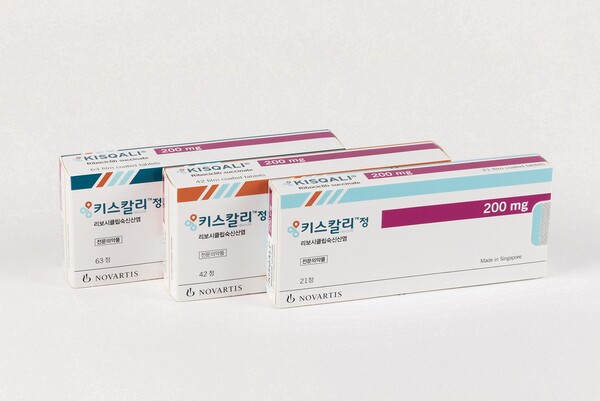Novartis Korea said that the Ministry of Food and Drug Safety has approved a new indication for Kisqali (ingredient: ribociclib), expanding its use to adjuvant therapy for patients with stage 2 and 3 early breast cancer (eBC) who are at high risk of recurrence and have hormone receptor-positive (HR+) and human epidermal growth factor receptor 2-negative (HER2-) disease.

With this approval, Kisqali extends beyond its established role in advanced and metastatic breast cancer to become a treatment option in the early-stage setting. The drug is now approved in combination with an aromatase inhibitor as adjuvant therapy for HR+/HER2- patients with stage 2 or 3 eBC.
The expanded indication is based on results from the global phase 3 NATALEE trial, which enrolled 5,101 patients across 20 countries. The randomized, open-label, multicenter study evaluated the efficacy and safety of Kisqali plus endocrine therapy compared with endocrine therapy alone.
The trial met its primary endpoint, showing a significant benefit in invasive disease-free survival (iDFS). At four years, iDFS was 88.5 percent for the Kisqali combination group versus 83.6 percent for the endocrine therapy group, representing an absolute improvement of 4.9 percentage points.
At the three-year analysis, the difference was 2.7 percentage points (90.8 percent vs. 88.1 percent), indicating that the gap widened over time.
Also, the risk of invasive disease progression or death was reduced by 28.5 percent with the Kisqali regimen compared to endocrine therapy alone. The benefit was consistent regardless of lymph node involvement.
“HR+/HER2- early breast cancer patients remain at risk of recurrence even with current therapies, and recurrence often progresses to distant metastasis, which is a significant burden for patients,” Professor Park Yeon-hee of the Division of Hematology-Oncology at Samsung Medical Center said. “The NATALEE trial demonstrated that Kisqali reduces recurrence risk across a broad patient population regardless of nodal status, while its low-dose regimen also provided favorable tolerability.”
This represents an important advance in clinical practice, Park added.
Yoo Byung-jae, general manager of Novartis Korea, also said, “Kisqali is an innovative therapy that has already proven survival benefits in metastatic breast cancer.”
With this new approval in early breast cancer, Novartis hope to ease the burden of recurrence risk for patients and deliver better treatment outcomes, Yoo added.
Yoo stressed that Novartis will continue to pursue patient-centered innovation and play a leading role across the entire breast cancer treatment journey in Korea.
Kisqali was first approved in Korea in October 2019 for the treatment of HR+/HER2- advanced or metastatic breast cancer. Its indications include use in combination with an aromatase inhibitor as first-line endocrine therapy for pre-, peri-, or postmenopausal women, and with fulvestrant for postmenopausal women whose disease has progressed following prior endocrine therapy.
Related articles
- If approved, Kisqali will intensify competition in early-stage breast cancer drug prescription
- Young-PEARL study’s survival data marks new milestone in premenopausal breast cancer at ASCO 2024
- [Photo News] Leading pharma giants unveil cutting-edge oncology research at ASCO 2024
- Korea's health insurance panel denies coverage for new cancer drugs
- Korea lines up 1st Lp(a) patients for Novartis’ pelacarsen with outcomes in 2026
- After celebrity breast-cancer awareness gala, a stage-IV patient lays out Korea’s Ibrance gap
- [ESMO 2025] Kisqali adjuvant therapy maintains efficacy at 5th year
- Novartis Korea cleared to expand Fabhalta indication to adult C3G patients

